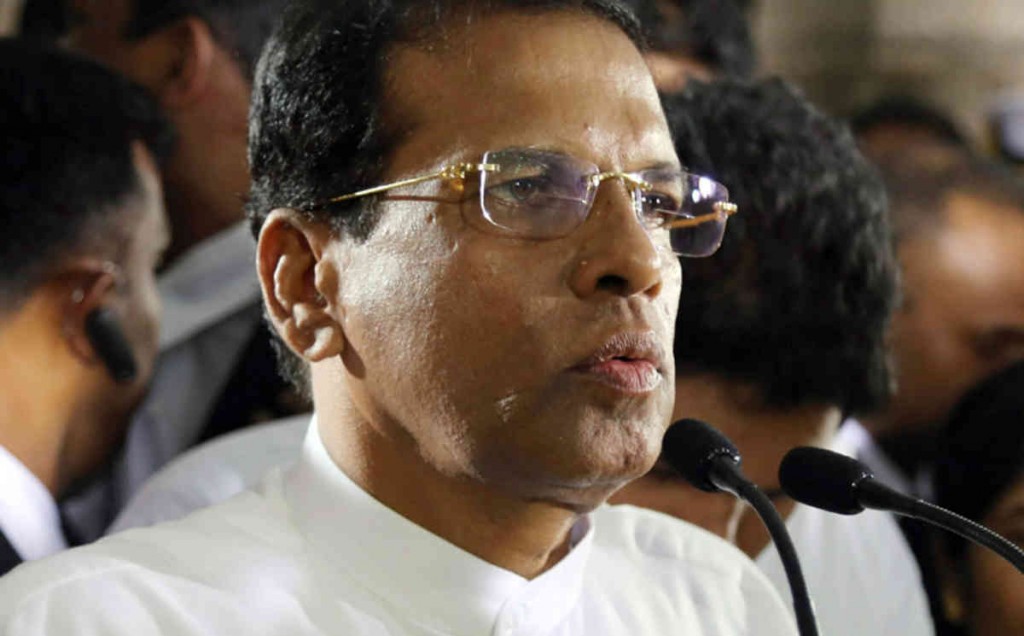Photo by EPA/M.A.PUSHPA KUMARA, via Sky News
I start with a quote from Shang Yang (390-338 BC), an insightful statesman in the Chinese state of Qin: “A country where the virtuous govern the wicked will suffer from disorder, so that it will be dismembered; but a country where the wicked govern the virtuous will be orderly, so that it will become strong.”
Although this quote on governance is over 2300 years old, the issues are still relevant. The January Presidential election was fought as one between stability and good governance. Such alternatives (i.e. order vs. virtue) are echoed in the above quote too. After Maithripala Sirisena won the election, the Rajapaksa camp warned that it may lead to separatist elements gaining an upper hand (cf. “dismemberment”); instead of the country becoming ‘strong’ through a long term Presidency. And at the end of the 100 day Sirisena regime, doubts were expressed whether it was either orderly or strong.
The quote of course is not a scientific law. At best, it encapsulates a social trend; and Karl Popper has clearly enunciated the difference between the two. A trend has very limited predictive power compared to a law. And it is almost impossible to posit ‘natural laws’ in the social sciences, which are also notoriously ‘fuzzy’ in nature, lacking the relative crispness of the pure sciences. Thus, there will be no unanimity as to whether the Sirisena regime is ‘virtuous’ – especially if account is taken of some (though not all) members of his cabinet. And while there are many in the country who will label the Rajapaksa regime as ‘wicked’ (with justifiable cause too), it may be difficult to ‘demonize’ it unanimously.
It is paradoxical however that while most of us would value virtue over wickedness (the process), we also tend to value stability over disorder (the outcome) – and therein lies the rub. Because Shang’s quote suggests that stability may be achievable only through wicked rulers, whereas virtuous ones may lead to a measure of disorder.
Is disorder then such a bad thing? I want to make three arguments for choosing instability and disorder over stability and order. The first argument stems from the Shang quote itself. Although it is not easy to arrive at causes by studying effects (a form of reasoning called abduction and used by diagnosticians), it may very well be that a stable society arises because of wicked rulers whereas instability could be a sign that rulers are virtuous.
My second argument stems from the notion of democracy, to which lip service is paid the world over, even by regimes bordering on totalitarianism. The association of democracy with disorder goes back to Athens, supposedly the birthplace of democracy. Plato, quoting Socrates calls it “a charming form of government, full of variety and disorder, and dispensing a sort of equality to equals and unequals alike”. Of course there is a strong notion that democracy delivers justice too, which is probably why it is paid so much lip service. The American theologian Reinhold Niebuhr said “Man’s capacity for justice makes democracy possible, but man’s inclination to injustice makes democracy necessary.” Anyone who values democracy (and the justice it delivers) therefore should be prepared for a degree of instability.
My final argument is that instability is associated with positive change. Many people feel that the scientific revolution in Europe arose in a climate of social instability, arising from the authority of the established church being challenged, primarily by those within the church itself. And the industrial revolution in England took place in a climate of political flux, when the power of the King was being replaced by that of the Parliament. So lack of stability and order can give rise to positive changes, especially when the previous state of equilibrium has been unjust and unfair.
A final comment – Shang Yang’s quote was made at a time when Chinese states were at war with each other. So it may even be argued that to forget virtue a little during times of war is acceptable for the sake of order (I would not advocate it however, because the inexorable ‘cosmic’ laws of justice will come back to haunt us). But we have finished our war – it is 6 years since we did. This is a time to espouse the process of being virtuous (whatever the outcome will be) rather than insisting on stability at any cost, because we may have to allow, participate in or commit great wickedness in order to achieve it.
Speaking for myself, and many people in this country I think, President Maithripala Sirisena’s great appeal stems from the fact that he is not in control of everything. It suggests that he is more democratic and virtuous. President Mahinda Rajapakse on the other hand tried to make sure that he had everything under his control – deeply disturbing at best. And even where potential “dismemberment” is concerned, in my opinion, President Sirisena’s conciliatory gestures to northern citizens, and the TNA’s rapport with him, makes separatism much less likely now than under the Rajapakse iron fist.
